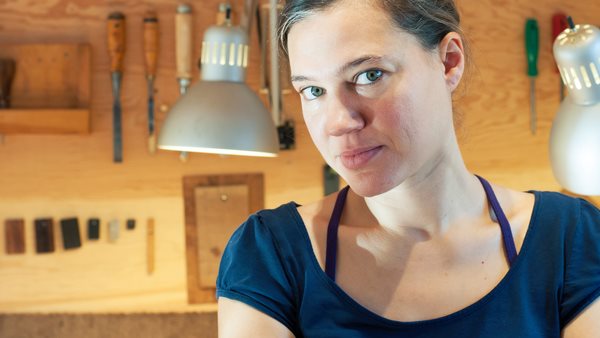
How did you become interested in lutherie?
"My father is a guitar maker so I grew up with it. As I child I used to go to work with him. I enjoyed driving toy cars through the sawdust on the floor, making roads and whatnot. When I was quite young I really enjoyed sanding scrap blocks of hard/dense woods such as maple. Spending days seeing just how smooth I could make it. I suppose in a way I fell in love with woodworking already at that young age."
"At the age of 13, I started my first guitar. My younger brother, Sagen had decided to make one. I was jealous that he was doing it and also wanted to, so we built our first guitars side by side."
"Once the first one was completed the natural thing seemed to be to build another, and so on. It was in my early 20’s that I started getting a lot more serious about it, and realized this might actually be what I wanted to do."
How have you experienced changes in the business climate for luthiers over time?
"The biggest change has been social media and the internet in general, being able to promote your instruments online, rather than it only being through dealers and trade shows as in the past."
What qualities would you say are good to have as a guitar builder?
"Patience is the first thing that comes to mind as there are so many mistakes made in the beginning, so many jobs you need to redo before getting it right. Perseverance as well, and a passion for working with wood. That’s something I really like about guitar making, there’s really so many different jobs involved. It can certainly help to be a creative person, as there’s much you can experiment with."
"There are many different aspects to making a guitar, all of which tap into different skills, like creativity with handwork, precision with power tools. Finishing is an entirely different skill as well, with several different methods. That’s something that is so cool about it – with just about every job you can do, there are many approaches to take."
Is there a difference in the view of hand-built guitars today compared to back in the day - in what way?
"People now are more aware of lutherie as a job, and of handmade guitars in general. 20 years ago there was a select few that knew the value of handmade instruments, and most were unaware that they existed. Factory guitars were often seen as more desirable."
If you were to choose two work steps from the entire construction process, which steps do you think are the most fun?
"I really love all the handwork, from carving braces to carving necks. I also really enjoy French polishing, when the filling is done, and your fad is smoothly gliding on the surface of the sides, seeing how the finish brings out all the wonderful colours of the grain is an amazing feeling."
